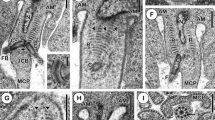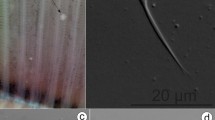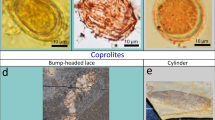Abstract
DURING the course of an investigation into oogenesis in the ascidian Molgula manhattensis a protozoan was discovered parasitizing a few of the nearly mature and fully mature eggs of one gonad. The ascidian which contained the infected gonad was one of several of the same species taken from Plymouth Sound in June 1963. Although there was insufficient material to classify the parasite accurately, the similarity of the observed stages to certain stages in the life-cycles of the Haplosporidia suggests that it is allied to this group1,2.
This is a preview of subscription content, access via your institution
Access options
Subscribe to this journal
Receive 51 print issues and online access
$199.00 per year
only $3.90 per issue
Buy this article
- Purchase on Springer Link
- Instant access to full article PDF
Prices may be subject to local taxes which are calculated during checkout
Similar content being viewed by others
References
Caullery, M., Traité de Zoologie, 1, II, 922 (Paris, Masson et Cie, 1953).
Weiser, J. (personal communication).
Lillie, R. B., Anat. Rec., 103, 611 (1949).
Author information
Authors and Affiliations
Rights and permissions
About this article
Cite this article
BURREN, C. A Protozoan Parasite of Molgula manhattensis (De Kay) (Urochordata). Nature 209, 101–102 (1966). https://doi.org/10.1038/209101a0
Issue Date:
DOI: https://doi.org/10.1038/209101a0
Comments
By submitting a comment you agree to abide by our Terms and Community Guidelines. If you find something abusive or that does not comply with our terms or guidelines please flag it as inappropriate.



